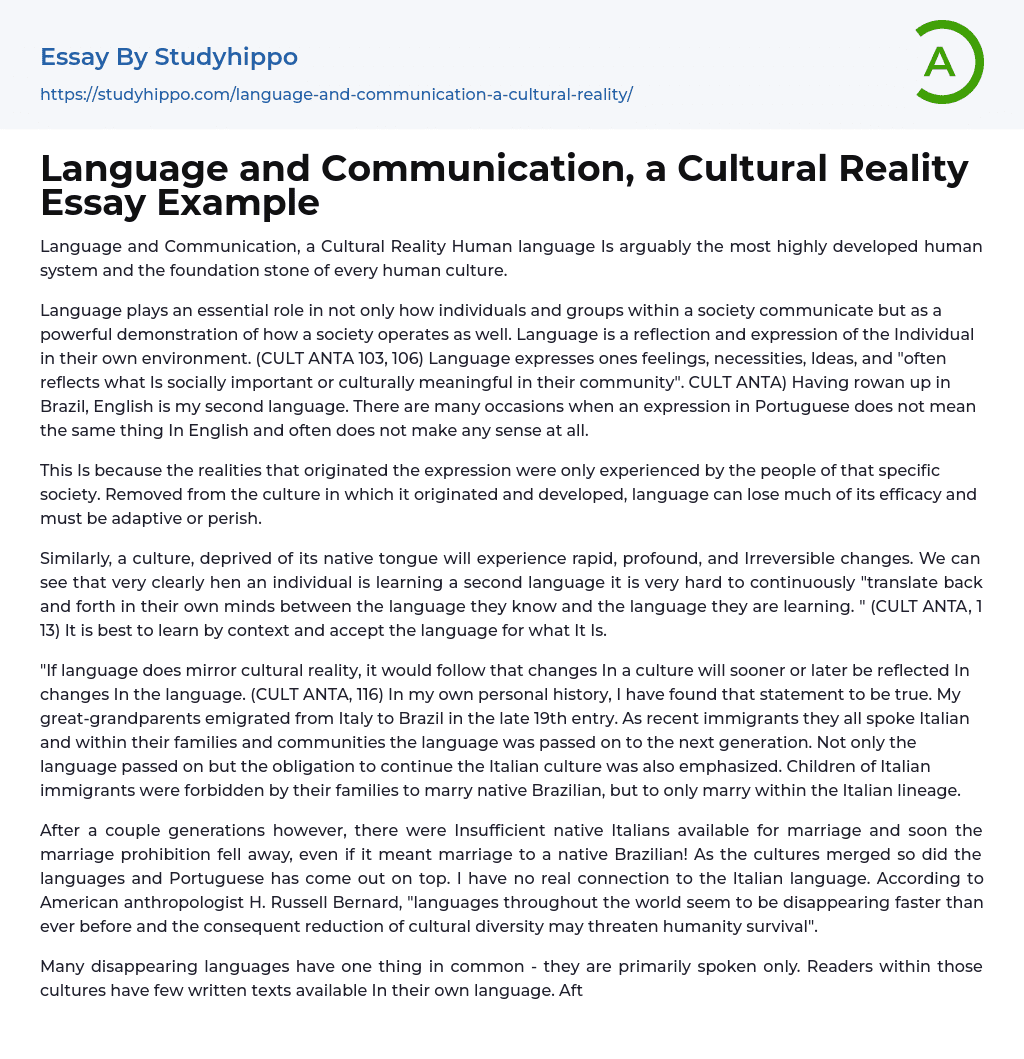

Language and Communication, a Cultural Reality Essay Example
Language and Communication, a Cultural Reality Human language Is arguably the most highly developed human system and the foundation stone of every human culture.
Language plays an essential role in not only how individuals and groups within a society communicate but as a powerful demonstration of how a society operates as well. Language is a reflection and expression of the Individual in their own environment. (CULT ANTA 103, 106) Language expresses ones feelings, necessities, Ideas, and "often reflects what Is socially important or culturally meaningful in their community". CULT ANTA) Having rowan up in Brazil, English is my second language. There are many occasions when an expression in Portuguese does not mean the same thing In English and often does not make any sense at all.
This Is because the realities
...that originated the expression were only experienced by the people of that specific society. Removed from the culture in which it originated and developed, language can lose much of its efficacy and must be adaptive or perish.
Similarly, a culture, deprived of its native tongue will experience rapid, profound, and Irreversible changes. We can see that very clearly hen an individual is learning a second language it is very hard to continuously "translate back and forth in their own minds between the language they know and the language they are learning. " (CULT ANTA, 1 13) It is best to learn by context and accept the language for what It Is.
"If language does mirror cultural reality, it would follow that changes In a culture will sooner or later be reflected In changes In the language. (CULT ANTA, 116) In my own personal
history, I have found that statement to be true. My great-grandparents emigrated from Italy to Brazil in the late 19th entry. As recent immigrants they all spoke Italian and within their families and communities the language was passed on to the next generation. Not only the language passed on but the obligation to continue the Italian culture was also emphasized. Children of Italian immigrants were forbidden by their families to marry native Brazilian, but to only marry within the Italian lineage.
After a couple generations however, there were Insufficient native Italians available for marriage and soon the marriage prohibition fell away, even if it meant marriage to a native Brazilian! As the cultures merged so did the languages and Portuguese has come out on top. I have no real connection to the Italian language. According to American anthropologist H. Russell Bernard, "languages throughout the world seem to be disappearing faster than ever before and the consequent reduction of cultural diversity may threaten humanity survival".
Many disappearing languages have one thing in common - they are primarily spoken only. Readers within those cultures have few written texts available In their own language. After his research and work tit different groups he found that computers "can help preserve language diversity by enabling native authors to produce literature in their own language. " (Bernard) 1 OFF speak as a child in your mother-land, it is never the same as expressing yourself in your native tongue.
The contextual details and intended meaning of words and expressions get lost in translation.
It is important to preserve native language because the loss of it "is to lose aspects of how a
people make sense of themselves and the world they live in and the values that culturally and physically bind a people gather shaping their identity. " (CULT ANTA, 112) -Therefore, the need for native people to be able to write, and express themselves in their own language. Bernard states that "many have the desire to do so", (Bernard) but the cost of publishing a book can be very high.
Computers can facilitate and speed up the writing and editing process. As this technology becomes relatively less expensive and prevalent, more writers will have the opportunity to produce works written in their own language.
(Bernard) Concerns that "computer-based" publishing could "lead native people to hung their oral tradition" or that the "people must give up the beauty and power of the oral world to gain the power of literacy' have proven to be wrong by Bernard.
While working with speakers of Com, a tonal language, spoken by the Com people of Cameroon (a country in the west Central Africa region), (Wick) Bernard found that, "Com speakers had learned to mark tones so others could read their work" but this made writing tedious, leading them to not want to write at all. As a solution, he programmed a character set that included all the vowels with tone markings thus enabling writing via computer. Even then it was a difficult writing process. A few participants gave up on adding the tones and continued writing freely without worries.
- Greeting essays
- Orality essays
- Intercultural Communication essays
- Interpersonal Communication essays
- Cross-Cultural Communication essays
- Nonverbal Communication essays
- Effective Communication essays
- Communication Skills essays
- Second Language essays
- English Language essays
- Semiotics essays
- Dialect essays
- Sign Language essays
- Spanish Language essays
- French Language essays
- Language Education essays
- Second Language Acquisition essays
- Teaching English As A Foreign Language essays
- Verb essays
- Gesture essays
- Arranged Marriage essays
- Communication essays
- Conflict Management essays
- Conflict Resolution essays
- Connection essays
- Conversation essays
- Dating essays
- Friendship essays
- Mediation essays
- Agriculture essays
- Albert einstein essays
- Animals essays
- Archaeology essays
- Bear essays
- Biology essays
- Birds essays
- Butterfly essays
- Cat essays
- Charles Darwin essays
- Chemistry essays
- Dinosaur essays
- Discovery essays
- Dolphin essays
- Elephant essays
- Eli Whitney essays
- Environmental Science essays
- Evolution essays
- Fish essays
- Genetics essays
- Horse essays



